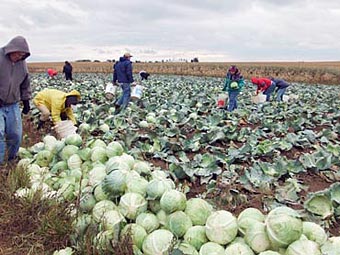UW fields and gardens help feed people in need
Food bank workers have been lining up for tons of potatoes produced at UW–Madison’s agricultural research stations at Rhinelander and Hancock this fall.

Volunteers from the Madison Area Food Pantry Gardens harvest cabbages at the Arlington Agricultural Research Station near DeForest, Wisconsin on Oct. 14, 2009.
Photo: Daniel Johnson
“We have had food pantry organizers coming from Shawano, Wausau, Tomahawk, Rhinelander, Minocqua and Price County, just to name a few,” reports Bryan Bowen, superintendent at the Rhinelander station.
Dane County food distributors have received a wide variety of produce from the university’s West Madison station, including some new super-sweet watermelon varieties that won’t hit supermarket shelves for a year or two. Volunteers at the Allen Centennial Gardens on campus recently loaded a trailer with purple okra, multicolored cabbages and other bounty from an “ornamental edibles” garden for a food pantry across town.
At the sprawling Arlington agricultural research station, volunteers gathered up about 50,000 pounds of cabbage and 15,000 pounds of potatoes as part of a community food pantry garden program coordinated by emeritus faculty and staff.
Since these research and teaching facilities exist to glean and distribute knowledge, the food they produce is technically a byproduct. But it’s getting put to very good use.
The mission of the Rhinelander station, for example, is to develop new lines of potatoes. Each year the station ends up with a surplus of potatoes from plants that don’t make the cut as potential new varieties, explains Bowen.
“We are looking to find all the desired breeding traits combined in one plant,” he says. “Many of the plants don’t have the right mix of traits, but the potatoes they produce are perfectly good to eat.”
For more than 60 years, that surplus has gone to the state prison system in exchange for harvest labor. That still happens. But in recent years, part of the harvest has gone to north central Wisconsin food pantries. This year the volume of potatoes donated increased dramatically, thanks to cash and in-kind contributions from local farms and businesses that help offset the cost of harvest and handling.
On just one day in September, 20 tons were picked up for distribution by the Salvation Army in Wausau and a food pantry in Shawano. A lot of people pitched in to make that happen, says Bob Gutknecht of the Wausau office of the Wisconsin Department of Agriculture, Trade and Consumer Protection, who helped coordinate the effort.
“The Rhinelander station provided the potatoes and oversight of the harvest. The Department of Corrections brought in 12 inmates for hand picking and bagging,” Gutknecht says.
Zeloski Farms in Eagle River donated burlap bags, while Ardex, a mineral company in Shawano, supplied a truck, and Bennett Hardwoods in Wausau provided a staging for distribution, he adds.
The first half of the 20 tons picked up that day went to the Salvation Army in Wausau to feed about 750 families. The second load went to Shawano, where food bank organizers estimated that the potatoes would be distributed within a week and a half.
“When we returned to Rhinelander for the second load, I told one of the inmates working at the station that the potatoes he’d helped bag were already being distributed to over 700 families. He was proud of that and told us that he would be calling his mom to let her know that even though he was in prison, he was doing good things for people,” Gutknecht says.
Subscribe to Wisconsin Ideas
Want more stories of the Wisconsin Idea in action? Sign-up for our monthly e-newsletter highlighting how Badgers are taking their education and research beyond the boundaries of the classroom to improve lives.



